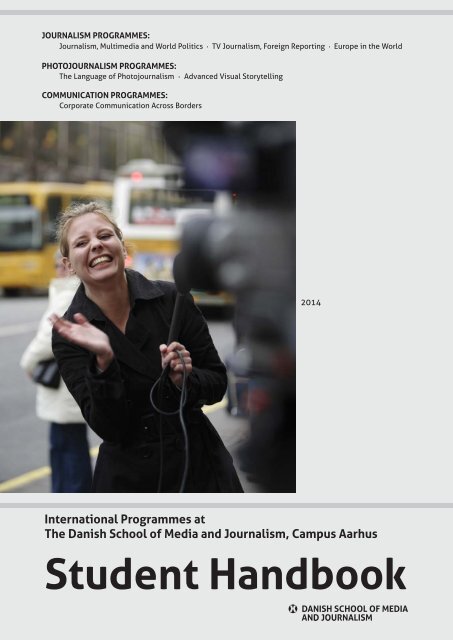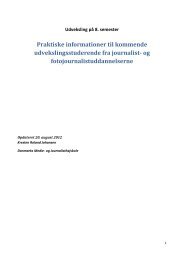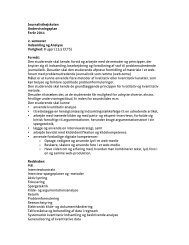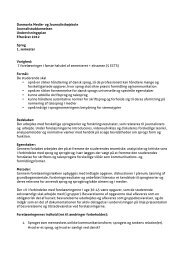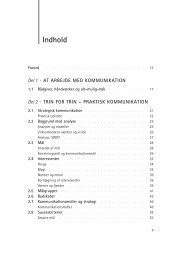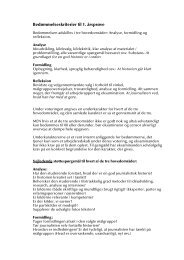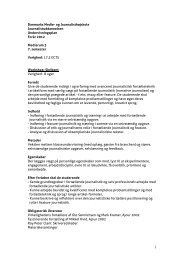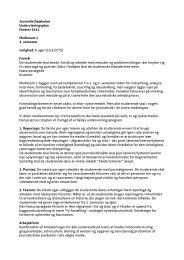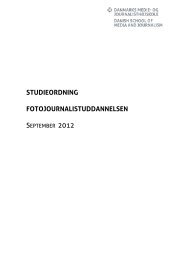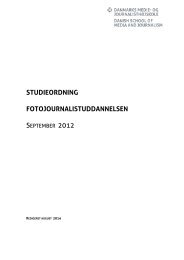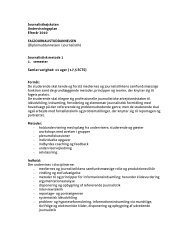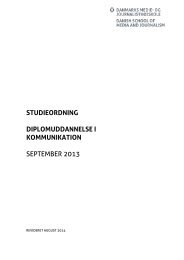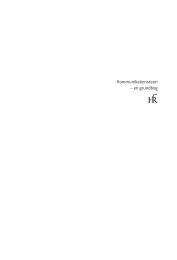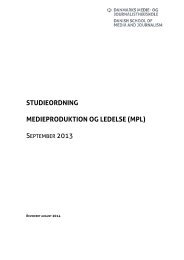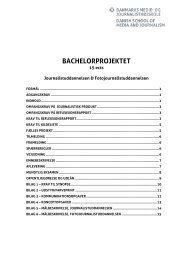Student Handbook
Student Handbook
Student Handbook
You also want an ePaper? Increase the reach of your titles
YUMPU automatically turns print PDFs into web optimized ePapers that Google loves.
JOURNALISM PROGRAMMES:<br />
Journalism, Multimedia and World Politics . TV Journalism, Foreign Reporting . Europe in the World<br />
PHOTOJOURNALISM PROGRAMMES:<br />
The Language of Photojournalism . Advanced Visual Storytelling<br />
COMMUNICATION PROGRAMMES:<br />
Corporate Communication Across Borders<br />
2014<br />
International Programmes at<br />
The Danish School of Media and Journalism, Campus Aarhus<br />
<strong>Student</strong> <strong>Handbook</strong><br />
<strong>Student</strong> <strong>Handbook</strong> 2014 1
Content<br />
Welcome to the Danish School of Media and Journalism 3<br />
DMJX: Overview 4<br />
DMJX: Background 5<br />
School facilities 6<br />
Computers 6<br />
Email 6<br />
Library 6<br />
Access to DMJX evenings and weekends 6<br />
What we expect from you 7<br />
Comparative table of grading systems 8<br />
Registration upon arrival 10<br />
EU citizens 10<br />
Scandinavian citizens 10<br />
American, Canadian and other non EU citizens 10<br />
Living in Aarhus 11<br />
Housing 11<br />
Health Insurance 11<br />
Visit the GP (Doctor in general practise) 12<br />
Dentist 12<br />
Transportation in Aarhus 12<br />
Bicycles 12<br />
Social life 12<br />
More information 12<br />
Staff 14<br />
Danish language 16<br />
Graphic Design: Susanne Sommer & Henrik Meller. Photos: Jesper Voldgaard & Søren Pagter<br />
2 <strong>Student</strong> <strong>Handbook</strong> 2014
Welcome to the Danish School of Media<br />
and Journalism<br />
A warm welcome to the Danish School of Media<br />
and Journalism (DMJX) and a new international<br />
environment that hopefully will give you both<br />
professional and social challenges over the next<br />
semester. Our greatest satisfaction results from the<br />
evaluations when we see that students have moved<br />
to a higher understanding of both subject of study<br />
and themselves.<br />
DMJX has a variety of permanent staff and both<br />
national and international guest lecturers from<br />
the media. Furthermore, DMJX prioritize to have<br />
strategic partnerships with the best journalism<br />
schools around the world. In cooperation with<br />
strategic partners, DMJX is European coordinator<br />
for projects from EU programs like the EU-New<br />
Zealand and the Erasmus Mundus Programmes, and<br />
have a broad partnership with Erasmus bilateral<br />
agreements. These activities have helped to<br />
sponsor course development and the exchange of<br />
both teachers and students. The Nordic roots are<br />
developed through partnerships with journalism<br />
schools from the Nordic countries. We look forward<br />
to having you as a student for the next semester,<br />
and hope you will grab the opportunity to be part<br />
of a both national and international environment,<br />
and form a network which will be a benefit for your<br />
future life as a journalist or within communication,<br />
being part of a strong alumni after you have left<br />
DMJX.<br />
As we hopefully contribute to your process of<br />
getting a better understanding of journalism and<br />
communication in an international environment,<br />
we do hope you will contribute to the ongoing<br />
process of maintaining the high quality<br />
international journalism education at DMJX.<br />
A Warm Welcome from<br />
Anna Nejrup, International coordinator<br />
incoming students Aarhus<br />
Inger Munk, Head of International Department<br />
The international programs covered by<br />
this handbook are the following:<br />
Journalism, Multimedia and World Politics: The<br />
semester in Denmark combines journalistic training<br />
with intensive study. In the course of an intensive<br />
one-semester program you do international<br />
reporting, EU reporting, learn about risk reporting<br />
and expand your view on world politics. The work<br />
concludes in a multi-media production based on a<br />
research travel in or outside Denmark.<br />
Undergraduate class of max 26 students from<br />
Denmark, Europe and the rest of the world.<br />
TV Journalism, Foreign Reporting: An intensive<br />
semester class which combines practical<br />
TV-journalistic training with theoretical studies.<br />
You will produce sharply angled journalism stories<br />
in the style of “Foreign correspondent reporting”.<br />
In addition you will acquire analytical skills of<br />
TV/video stories through use of academic theory<br />
and approaches. You will reflect upon journalism<br />
activity in general and according to your own<br />
practice, including ethical and professional<br />
dilemmas. You will foster skills in inclusive<br />
journalism and develop a critical understanding<br />
of the relevant social and media structures in the<br />
World, and gain knowledge on contemporary world<br />
politics and focus on the major historical changes in<br />
the world, and specific in Europe.<br />
We have one of the best educational and training<br />
facilities for TV-journalism in Europe, with for<br />
example exclusive access to shooting and editing<br />
facilities throughout the course.<br />
Upper level class of max 21 students from Denmark,<br />
Europe and the rest of the world.<br />
The Language of Photojournalism: The semester<br />
in Denmark offers you a chance to combine<br />
photo journalistic training with intensive<br />
study. The program focuses on the language of<br />
photojournalism combined with the journalistic<br />
disciplines like writing and adding sound to<br />
pictures. Under graduate class of max 8 - 10<br />
students from Europe and the rest of the world.<br />
Advanced Visual Storytelling: This advanced photojournalism<br />
semester offers you a chance to study in<br />
Denmark together with a class of Danish students<br />
<strong>Student</strong> <strong>Handbook</strong> 2014 3
of photojournalism. The Danish students attending<br />
this program are at their final semester of a<br />
four-year study. The group seize is max 16 students.<br />
Europe in the World: A one-year specialization in<br />
European affairs and how to report it. Starting every<br />
September with four months in Utrecht, NL where a<br />
foundation is built in European history, regional<br />
economics, EU institutions and EU politics. The<br />
students finish with five months in Denmark where<br />
the focus is foreign policy and analytical journa lism.<br />
The work concludes in a multimedia production<br />
for the web magazine Euroviews and a final exam<br />
project. <strong>Student</strong>s may obtain an Europe in the World<br />
Diploma and an additional honors diploma.<br />
Upper level class of 20 students from Denmark,<br />
Europe and the rest of the world.<br />
Corporate Communication Across Borders:<br />
Offered autumn semesters.<br />
This semester presents various perspectives of<br />
Corporate Communication and combines<br />
theoretical insights with enterprise practices.<br />
<strong>Student</strong>s will be presented to a broad range<br />
of corporate communication disciplines, and<br />
will get insight into how selected international<br />
companies deal with disciplines such as cross<br />
cultural communication, reputation management<br />
and corporate social responsibility. Companies<br />
are bounded by economy, society and politics as<br />
conditions for doing business, and students get an<br />
insight in why and how companies deal with these<br />
challenges in practice.<br />
Advanced undergraduate level class of 50 Danish<br />
and international students. Participants have<br />
studied Communication for at least two years.<br />
Mentor arrangement<br />
Each semester, we arrange with 3-4 Danish students<br />
that they will be your mentor team. They will be<br />
able to answer questions you might have regarding<br />
your arrival. They will meet you when you arrive in<br />
Aarhus, give you your key to your new address,<br />
help you get settled and arrange some social events<br />
during your first time here in Aarhus.<br />
The mentors take contact to You shortly after you<br />
have been admitted to the semester programme,<br />
and arrange a facebook group, so you may be<br />
in contact with the mentors and your fellow<br />
international students.<br />
DMJX: Overview<br />
The Danish School of Media and Journalism<br />
covers the whole media sector offering a wide range<br />
of bachelor’s and master’s degrees, diplomas and<br />
further education in journalism, photo journalism,<br />
communication, design, media management etc.<br />
Currently, more than 1900 full time students are<br />
enrolled and almost 4000 course participants enroll<br />
in further education on a yearly basis.<br />
DMJX has about 170 full time employees.<br />
DMJX is a state institution with its own ministerial<br />
law: “Law on The Danish School of Media and<br />
Journalism”. It is governed by a board, who appoints<br />
a rector who is in charge of the day to day running<br />
of DMJX concerning staff, administration and<br />
economy.<br />
Current rector is Jens Otto Kjær Hansen.<br />
Rector Jens Otto Kjær Hansen<br />
4 <strong>Student</strong> <strong>Handbook</strong> 2014
DMJX: Background<br />
A historical scribe<br />
• The Danish School of Media and Journalism was<br />
formed in 2008 by a merger between<br />
• The Danish School of Journalism<br />
• UPDATE<br />
• The Graphics Art Institute of Denmark<br />
The merger of the three educational establishments<br />
means that the school now covers the whole media<br />
sector and provides design and content to the media<br />
industry, as well as giving students and teachers the<br />
opportunity to exchange knowledge and experience<br />
of the media sector across specialist groups.<br />
The Danish School of Journalism<br />
The first Danish journalism course was established<br />
as part of Aarhus University in 1946. In 1971,<br />
Danmarks Journalisthøjskole (the Danish School of<br />
Journalism) was established as a free standing<br />
institution doing research and teaching at the<br />
undergraduate level offering a BA in Journalism.<br />
In 1992, the four year BA course of photojournalism<br />
was started. Part of this course is taught together<br />
with the BA in journalism.<br />
Both journalism and photojournalism have been<br />
internationally oriented for a long time. The very first<br />
international program, ” Europe in the World”, was<br />
launched in 1990, and have been followed by five<br />
international semester programmes in journalism,<br />
photo journa lism, and corporate communication.<br />
In 2004 the Danish School of Journalism in<br />
cooperation with Aarhus University and four<br />
European Universities was granted the Erasmus<br />
Mundus Masters stamp with the Erasmus Mundus<br />
Masters Journalism, Media and Globalization.<br />
This global start was followed by two national<br />
masters courses in journalism offered by the Danish<br />
School of Journalism and Aarhus University with the<br />
degree issued by Aarhus University.<br />
In 2011 a BA education in Corporate Communication<br />
was offered to start 2011 in Aarhus and 2013<br />
in Copenhagen.<br />
UPDATE<br />
Established in 2007 as Northern Europe’s largest<br />
centre for journalism training and skills with over<br />
100 training courses and other events offered each<br />
semester.<br />
The same year, UPDATE entered into a strategic<br />
alliance with the leading training establishment in<br />
the USA; the Poynter Institute in Florida, and runs<br />
the first Poynter summer school under UPDATE’s<br />
management.<br />
Further studies and training are offered both in<br />
Copenhagen and in Aarhus.<br />
The Graphics Art Institute of Denmark<br />
Founded in 1943 with the objective of creating a<br />
theoretical education for future graphic managers.<br />
For many years, its training courses have been<br />
focussed on economics and technology, but since<br />
the 1990s digital and print media have played a<br />
larger part in the training which has today<br />
developed into the existing Bachelor degrees in<br />
Media Production and Management.<br />
In 1956, a new stream was launched: Special<br />
studies in Graphic Design. The special study course<br />
puts most initial emphasis on book presentation,<br />
but moves on to include many other graphic design<br />
processes in both print and digital media. Over the<br />
years, the course has developed into a Bachelor<br />
degree course in Graphic Communications.<br />
At the suggestion of the TV and media industries,<br />
the Bachelor course in TV and Media Planning was<br />
added to the school’s full-time courses in 2006.<br />
In order to meet the increasing need for specialist<br />
staff in the media industry, Graphic Communications<br />
was divided into three streams in 2007:<br />
Graphic Design, Interactive Design and Creative<br />
Communication. A new BA course in photographic<br />
Communication was launched in 2012, and the BA<br />
course in Corporate Communication was launched<br />
in Copenhagen in 2013.<br />
<strong>Student</strong> <strong>Handbook</strong> 2014 5
School facilities<br />
Computers<br />
<strong>Student</strong>s use the school´s computers (Mac computers).<br />
<strong>Student</strong>s who prefer to work on their own<br />
computers are able use the school´s free wireless<br />
network.<br />
Email<br />
All students are granted an email address at the<br />
school, to be used during their stay in Aarhus.<br />
The email address is needed in order to make<br />
printouts and to get access to school computers<br />
and the wireless network. Official messages are<br />
sent to this email address.<br />
The DMJX-email is closed one month after the<br />
course has ended.<br />
Access to DMJX evenings and weekends<br />
If you want to work late or during weekends at<br />
DMJX, you need access cards. A special card is<br />
required for each department – Graphic<br />
Department, Television and Radio Department.<br />
A 200 DKK deposit is required.<br />
You can get hold of an access card to the Graphic<br />
Department by sending an email to ss@dmjx.dk or<br />
hm@dmjx.dk and make an appointment . You are<br />
required to show your study-card when applying.<br />
An access-card to the Television department can be<br />
acquired in the Television technicians’ office 060<br />
anytime during teaching hours. An access-card to<br />
the Radio department can be acquired in office 503<br />
Monday-Friday from 9.00-14.00.<br />
Library<br />
The school library and the Danish Media Archives<br />
are at your disposal. There are a variety of<br />
international papers and magazines. There are also<br />
computers specially set up for international wire<br />
services and databases. The Danish State<br />
and University library at the Aarhus University is<br />
open for use if you have a Danish social security<br />
number (CPR number) You may, however, always<br />
order books through the DMJX library.<br />
6 <strong>Student</strong> <strong>Handbook</strong> 2014
What we expect from you<br />
The Basics<br />
We strive to provide you with high quality,<br />
dedicated teaching in the DMJX international<br />
programmes. The rules and the procedures that<br />
govern the Danish students at DMJX also apply to<br />
the international students:<br />
In particular we call your attention to the following<br />
facts:<br />
• Be punctual in class. Classes start on time.<br />
• Inform the teacher if you are not able to come<br />
to class, and if you are ill.<br />
• Respect deadlines.<br />
• If students fail to submit work by a deadline<br />
without first requesting permission for an<br />
extension and being granted an extension, the<br />
work will not be accepted and the result will be<br />
a fail.<br />
• Observe the program policy and the rules on<br />
plagiarism and fabrication.<br />
• Bear in mind that sources, experts or people<br />
that you interview should be treated cordially<br />
and respectfully. You should honour any<br />
promises made to them.<br />
Program Policy<br />
We strive at the Danish School of Media<br />
and Journalism to uphold the standards of<br />
excellence in Journalism.<br />
We require the students to uphold the IJF standards<br />
of journalism in all their work:<br />
The IFJ Declaration of Principles on the conduct of<br />
journalists:<br />
“This international declaration is proclaimed as a<br />
standard of professional conduct for journalists<br />
engaged in gathering, transmitting, disseminating<br />
and commenting on news and information in<br />
describing events.<br />
1. Respect for truth and for the right of the public<br />
to truth is the first duty of the journalist.<br />
2. In pursuance of this duty, the journalist shall at<br />
all times defend the principles of freedom in<br />
the honest collection and publication of news,<br />
and of the right of fair comment and criticism.<br />
3. The journalist shall report only in accordance<br />
with facts of which he/she knows the origin.<br />
The journalist shall not suppress essential<br />
information or falsify documents.<br />
4. The journalist shall use only fair methods to<br />
obtain news, photographs and documents.<br />
5. The journalist shall do the utmost to rectify<br />
any published information which is found to be<br />
harmfully inaccurate.<br />
6. The journalist shall observe professional<br />
secrecy regarding the source of information<br />
obtained in confidence.<br />
7. The journalist shall be aware of the danger of<br />
discrimination being furthered by the media,<br />
and shall do the utmost to avoid facilitating<br />
such discrimination based on, among other<br />
things, race, sex, sexual orientation, language,<br />
religion, political or other opinions, and<br />
national or social origins.<br />
8. The journalist shall regard as grave professional<br />
offences the following:<br />
• plagiarism;<br />
• malicious misrepresentation;<br />
• calumny, slander, libel, unfounded<br />
accusations;<br />
• acceptance of a bribe in any form in<br />
consideration of either publication or<br />
suppression.<br />
9. Journalists worthy of the name shall deem it<br />
their duty to observe faithfully the principles<br />
stated above. Within the general laws of each<br />
country the journalist shall recognise in professional<br />
matters the jurisdiction of colleagues<br />
only, to the exclusion of every kind of interference<br />
by governments or others.<br />
(Adopted by the 1954 World Congress of the IFJ.<br />
Amended by the 1986 World Congress.)<br />
When submitting your student work, be aware that<br />
plagiarism is presenting someone else’s words,<br />
images or other work as your own without credit or<br />
attribution. This includes quoting without proper<br />
attribution.<br />
Be aware that fabrication in the form of deliberately<br />
using bogus information is an act of dishonesty.<br />
Be aware that violations of the basic rules of<br />
journalism will result in failing the course where<br />
the violation occurs or in expulsion from the<br />
program. Written assignments are being checked by<br />
the plagiarism detection system Urkund.<br />
If you are in doubt consult your teacher.<br />
<strong>Student</strong> <strong>Handbook</strong> 2014 7
Comparative table of grading systems<br />
The Danish 7-point marking scale * ECTS grade ** US grade<br />
12<br />
For an excellent presentation that demonstrates a high level<br />
of command of all aspects of the relevant material and<br />
containing no or only few minor weaknesses.<br />
A<br />
A+<br />
10<br />
For a very good presentation that demonstrates a high level of<br />
command of most aspects of the relevant material and<br />
containing only minor weaknesses.<br />
B<br />
A<br />
7<br />
For a good presentation that demonstrates good command of<br />
the relevant material but containing some weaknesses.<br />
C<br />
B<br />
4<br />
For a fair presentation that demonstrates some command of<br />
the relevant material but containing some major weaknesses.<br />
D<br />
C<br />
02<br />
For a presentation meeting only the minimum<br />
requirements for acceptance.<br />
E<br />
D<br />
00<br />
For a presentation not meeting the minimum<br />
requirements for acceptance.<br />
FX<br />
F<br />
-3<br />
For a presentation that is unacceptable in all<br />
respects.<br />
F<br />
F-<br />
* ECTS: European Credit Transfer System<br />
** US grade is compared with www.discoverAbroad.com<br />
Study Rules<br />
Our international courses are centered around<br />
production. You will have lectures, literature and<br />
evaluation sessions, but most of your time will<br />
be spent outside the classroom in some phase of<br />
production. Theory, therefore, is doubly matched<br />
with practice. It is “learning-by-doing.”<br />
Your attendance is expected at all lectures and<br />
evaluations and your participation is expected in<br />
the production of all assignments.<br />
Grading<br />
All international courses are full course load<br />
semester programs run in English. The journalism<br />
courses are designed for students with a background<br />
in journalism understanding the basic concepts of<br />
angle, source management and documentation.<br />
Some courses are graded passed/not passed. Some<br />
courses are graded by the Danish grading system;<br />
please see the conversion table for ECTS and US<br />
equivalents. If grades are needed, all courses may<br />
be graded; this requires that an agreement on this is<br />
made in advance with the international office contact<br />
anna@dmjx.dk. <strong>Student</strong>s’ activities are graded based<br />
on active attendance at lectures, preparation for the<br />
lectures, participation in group work, written and<br />
other assignments, punctuality and in some cases<br />
examinations.<br />
Workshop teachers may ask students to redo,<br />
correct or adjust specific tasks or assignments in<br />
case of these being insufficient.<br />
No student who has received a passing mark for an<br />
assignment will be permitted to resubmit in order<br />
to gain a better result; the first result stands.<br />
Each student has three chances to obtain a passing<br />
mark for each course. Special regulations apply for<br />
the final project.<br />
Attendance<br />
Due to the working style at the Danish School<br />
of Media and Journalism where group work and<br />
coaching have a high priority, students are expected<br />
to attend all classes. If you for some reason cannot<br />
come, you must call the Danish School of Media and<br />
Journalism. In order to pass a course you must in<br />
principle attend all classes. Exceptions can be made<br />
if you show a medical certificate and/or you make<br />
an arrangement with the teacher.<br />
Phone<br />
We expect that you have a mobile phone when<br />
you arrive, and that you buy phone cards for your<br />
mobile upon arrival. The mobile is an important part<br />
of your journalistic equipment. For long distance<br />
calls, we advise students to buy global cards/other<br />
cards and/or use Skype.<br />
8 <strong>Student</strong> <strong>Handbook</strong> 2014
<strong>Student</strong> <strong>Handbook</strong> 2014 9
Registration upon arrival<br />
All international students must register at a civil<br />
authority.<br />
We expect everyone to register within the first<br />
couple of days after your arrival. There are different<br />
procedures for EU and non EU students.<br />
EU citizens<br />
Go to Statsforvaltningen Midtjylland, Afdelingskontor<br />
Aarhus, Lyseng Allé 1, 8270 Højbjerg. Fill<br />
out an application form (included in your welcome<br />
package), bring the letter from DMJX stating the<br />
Erasmus/Socrates period (also included in your<br />
welcome package) and bring your passport and<br />
2 photos. They will give you a residence permit.<br />
Opening hours: Statsforvaltningen Midtjylland<br />
Monday, Tuesday, Wednesday from 09:00-15:00<br />
Thursday from 09:00-17:00<br />
Friday from 09.00-12:00<br />
When you have received your residence permit<br />
from Statsforvaltningen Midtjylland, you bring this<br />
permit to the Borgerservice, Rådhuset (city Hall),<br />
Tårnindgangen, Park Allé, 8000 Aarhus C. They will<br />
give you a CPR number. Remember to bring your<br />
passport.<br />
Opening hours: Borgerservice, Rådhuset<br />
Monday, Tuesday, Wednesday,<br />
Friday from 09:00-16:00<br />
Thursday from 10:00-18:00<br />
Scandinavian citizens<br />
Go directly to the Borgerservice, Rådhuset (city<br />
Hall), Tårnindgangen, Park Allé, 8000 Aarhus C.<br />
Bring your passport, and they will give you a CPR<br />
number.<br />
Opening hours: Borgerservice, Rådhuset<br />
Monday, Tuesday, Wednesday,<br />
Friday from 09:00-16:00<br />
Thursday from 10:00-18:00<br />
American, Canadian and other non EU citizens<br />
You should go to the Borgerservice, Rådhuset (city<br />
Hall), Tårnindgangen, Park Allé, 8000 Aarhus C<br />
within 5 days in order to receive your CPR number<br />
and be covered by the Danish social securitysystem.<br />
You will need to bring your residence permit letter<br />
and your passport. You will automatically receive<br />
your residence permit (residence card type Z) by<br />
mail within approximately 4 weeks after registering<br />
with the local authorities. Please remember to write<br />
your full name on your mail box. Please contact us if<br />
you don’t receive your residence card.<br />
Opening hours: Borgerservice, Rådhuset<br />
Monday, Tuesday, Wednesday,<br />
Friday from 09:00-16:00<br />
Thursday from 10:00-18:00<br />
Other uses of CPR card<br />
The “CPR-card” is not only of value when it comes<br />
to health insurance. It makes it easier for you to<br />
open a bank account and receive a library card for<br />
the State Library in Aarhus.<br />
And you might be asked to show it when entering<br />
some of the night-clubs and discos.<br />
10 <strong>Student</strong> <strong>Handbook</strong> 2014
Living in Aarhus<br />
Housing<br />
It is hard to find housing in Aarhus. The Danish<br />
School of Media and Journalism is cooperating<br />
very closely with the Aarhus Municipality office for<br />
<strong>Student</strong> Housing (Kollegiekontoret) and the places<br />
international students are staying are distributed<br />
by Kollegiekontoret. Please respect the rules at the<br />
places, so DMJX is able to maintain the good<br />
relationship to these dormitories and future<br />
international students can stay there as well.<br />
Each rent is paid by you at a local post office, at any<br />
bank or by internet-banking. You will receive a bill<br />
in your room each month. Rents are paid in advance<br />
at the beginning of the month.<br />
Please bear in mind that it is your own<br />
responsibility to make sure that the rent is paid on<br />
time. If you fail to pay the rent before the 3rd<br />
working day, the local housing administration<br />
office (Kollegiekontoret) will charge you a late fee<br />
of about 200 DKK.<br />
You are expected to keep your room clean and in<br />
an acceptable condition. You will also have joint<br />
responsibility for the maintenance of shared facilities<br />
such as the kitchen and common rooms. Lack in<br />
maintenance and cleaning of your room will result<br />
in heavy deductions from your deposit. Approximately<br />
2 months after you have moved out of your<br />
room, the deposit will be sent to you according to<br />
your own instructions.<br />
Please note that most of the dormitories require<br />
students to move out 7 working days before the end<br />
of the last month of your lease-agreement.<br />
Most students´ residences are not located in the<br />
city centre, but the bus connections and bicycle<br />
paths in Aarhus are quite good. Private rooms tend<br />
to be more centrally located.<br />
Living with Danish students is a good way to learn<br />
something about the local culture and perhaps even<br />
a little Danish. Danes can be a little reserved, so be<br />
prepared to take the first step when getting to know<br />
your neighbours. You will soon find out that Danes<br />
are usually easy-going and quite friendly. Every<br />
dorm has its own house rules – please follow them.<br />
If you have any questions, you are welcome to ask<br />
your neighbours how things work at your dorm.<br />
Health Insurance<br />
You need to buy a health insurance to cover you<br />
during the first 7 weeks after your arrival and<br />
registration. It will take 5-6 weeks for you to get a<br />
card with your Personal Registration Number (CPRnumber)<br />
after you have registered. When you get it<br />
you are eligible to receive health benefits and are<br />
covered by the Danish health insurance system.<br />
<strong>Student</strong> <strong>Handbook</strong> 2014 11
Visit the GP (Doctor in general practise)<br />
With the CPR card, visits to the GP, any eye or earspecialist<br />
as well as any hospitalisation in a public<br />
hospital are free. When getting your CPR-number<br />
you choose a GP/Family doctor you can contact if<br />
you fall ill, need prescriptions, vaccinations etc.<br />
Please be aware that you need to make an appointment<br />
before going to your GP and you must pay for<br />
all medicine, inclu_ding prescribed medicine.<br />
Contact Out-of-hours medical service if you need to<br />
see a doctor outside your own GP’s opening hours.<br />
Out-of-hours medical service is open from 16.00-<br />
08.00 Monday – Friday and 24 hours at weekends<br />
and bank holidays. Call +45 7011 3131 for Out-ofhours<br />
medical service to make an appointment.<br />
Dentist<br />
Dental costs are only partly covered by the Danish<br />
health insurance system.<br />
Transportation in Aarhus<br />
The bus system in Aarhus is very efficient. Bus lines<br />
to the city centre have bus stops right outside the<br />
DMJX. Bus timetables can be bought in the kiosks<br />
in town or you can find them on Midttrafik’s webpage:<br />
http://www.midttrafik.dk/in-english.aspx<br />
Ten trip cards can be obtained in any kiosk.<br />
Buy your bus pass or Aarhus Card here:<br />
Midttrafik Kundecenter (Customer Service)<br />
Aarhus Bus Station<br />
Fredensgade 45<br />
8000 Aarhus C<br />
Open monday to sonday 7.00 AM to 11.00 PM.<br />
Phone: 70 210 230<br />
Bicycles<br />
It is possible to look for a second-hand bike for sale<br />
in the classifieds of the local newspapers such as<br />
Aarhus Onsdag, which is delivered free of charge to<br />
all households on Wednesdays.<br />
Alternatively, you can purchase a bike through<br />
Østjysk Auktion (http://oj-auktion.dk). Auctions<br />
are held at Kringelled 6, 8250 Egå. It is possible to<br />
have the auction conducted in English but please<br />
remember to ask Østjysk Auktion a couple of days<br />
before the auction. You have to pay what you bid<br />
plus an auctioneer’s fee.<br />
You can also choose to use the public bikes. They<br />
are to be found all over town maybe used for<br />
a 20 DDK deposit<br />
Social life<br />
Friday Bar<br />
<strong>Student</strong>s at the Danish School of Media and<br />
Journalism have their own bar. It is situated in the<br />
school basement and is open every Friday from<br />
14.15 until 24.00.<br />
The bar is managed by student volunteers. In the<br />
beginning of each semester new volunteers are<br />
looked for. Approximately ten are required and<br />
international students are welcome.<br />
School parties<br />
The Danish School of Media and Journalism<br />
arranges two big school parties every semester.<br />
They are held in the school canteen and are very<br />
popular.<br />
<strong>Student</strong>erhus Aarhus (The <strong>Student</strong> House)<br />
During the first week of introduction, international<br />
students get introduced to <strong>Student</strong>erhus Aarhus<br />
and the Association of Erasmus <strong>Student</strong>s.<br />
<strong>Student</strong>erhus Aarhus is the meeting place for<br />
foreign students and Danes. It is a place where you<br />
can relax when you are not studying or working.<br />
It has years of experience in organising social<br />
activities, advising and providing practical<br />
information to foreigners living in Denmark. It is a<br />
non-profit, non-religious and non-political<br />
organisation. The aim of the student house is to<br />
promote international understanding by providing<br />
a relaxed atmosphere for social and cultural<br />
interaction and exchange.<br />
See more on www.studenterhusaarhus.dk.<br />
More information<br />
For more information on being an international<br />
student in Aarhus and Denmark, please visit:<br />
http://www.denmark.dk/en<br />
for a general information about Denmark.<br />
http://www.kl.dk/English/<br />
about the Danish Local Government System<br />
http://www.aarhus.dk/da/omkommunen/english.<br />
aspx and www.businessregionaarhus.com<br />
for general information about Aarhus.<br />
12 <strong>Student</strong> <strong>Handbook</strong> 2014
<strong>Student</strong> <strong>Handbook</strong> 2014 13
Staff<br />
Journalism, Multimedia and<br />
World Politics: Journalism Teachers<br />
The Photojournalism Courses:<br />
Photojournalism Teachers<br />
John Frølich, Ass. professor<br />
jf2@dmjx.dk, Journalist,<br />
the Danish School of Journalism.<br />
Diploma Course in foreign news reporting.<br />
European Studies at Aarhus University.<br />
Søren Pagter, Ass. Professor,<br />
Head of Photo Department<br />
sp@dmjx.dk, Press photographer,<br />
the Danish School of Journalism<br />
Asbjørn Slot Jørgensen,<br />
Ass. professor<br />
asbo@dmjx.dk, Journalist,<br />
The Danish School of Journalism<br />
Mads Greve, Ass. Professor<br />
mg@dmjx.dk, Photojournalist,<br />
the Danish School of Journalism<br />
Europe in the World: Journalism Teachers<br />
Øjvind Kyrø,<br />
Freelance journalist and author<br />
kyroe@city.dk, Journalist, The Danish School of<br />
Journalism, exam. art Religion<br />
Asbjørn Slot Jørgensen,<br />
Ass. Professor<br />
asbo@dmjx.dk, Journalist,<br />
The Danish School of Journalism<br />
Hans-Henrik Holm,<br />
Jean Monnet Professor<br />
and Professor of World Politics<br />
hhh@dmjx.dk, Political science.<br />
Guest Professor at various<br />
international universities<br />
14 <strong>Student</strong> <strong>Handbook</strong> 2014
Technical Teachers<br />
International Department<br />
Susanne Sommer, Graphic designer<br />
ss@dmjx.dk, Graphic designer<br />
Inger Munk, Head of Department,<br />
Coordinator International programs<br />
imu@dmjx.dk,<br />
MSc. Geography, Aarhus University<br />
Henrik Meller, Graphic designer<br />
hm@dmjx.dk, Graphic designer<br />
Anna Nejrup,<br />
International Coordinator,<br />
incoming students<br />
anna@dmjx.dk, MA in French and English,<br />
Aarhus School of Business<br />
Chester Folming,<br />
Relationship Manager<br />
cf@dmjx.dk, Multimedia Designer,<br />
Aarhus Business College<br />
Kresten Roland Johansen,<br />
Project Manager and<br />
International Coordinator,<br />
outgoing students<br />
krj@dmjx.dk, MA in History of Ideas and<br />
Political Science, Aarhus University<br />
Hans Bromand Nørgård,<br />
TV Technician<br />
hbn@dmjx.dk, TV Technician<br />
tf@dmjx.dk<br />
Tom Fangel,<br />
Technical Lecturer<br />
Alice Høier, Radio Technician<br />
alh@dmjx.dk, Radio Technician<br />
<strong>Student</strong> <strong>Handbook</strong> 2014 15
Danish language<br />
Courses are offered for free by lærdansk<br />
(www.laerdansk.dk) and introduced during<br />
the introduction week.<br />
Teach yourself Danish - online<br />
Free of charge<br />
Dansk nu – make a log-in and then you can use<br />
• Historien om Peter (the story about Peter)<br />
• Spil (games)<br />
• Udtale (pronunciation)<br />
http://www.dansk.nu<br />
With a fee<br />
Speak Danish: www.speakdanish.dk<br />
Short language guide<br />
Danish<br />
Food shopping<br />
English<br />
Drikkevarer<br />
Te<br />
Kaffe<br />
Øl<br />
Sodavand<br />
Saft (Juice)<br />
Kildevand<br />
Vand<br />
Pålæg<br />
Skinke<br />
Spegepølse<br />
Leverpostej<br />
Ost<br />
Gedeost<br />
Kød & Fjerkræ<br />
Beverages<br />
Tea<br />
Coffee<br />
Bear<br />
Soft drink<br />
Juice<br />
Spring water<br />
Plain water or tap water<br />
Cold cuts/spread<br />
Ham (pork)<br />
Salty sausage<br />
(pork, beef and lam)<br />
Liver paste (pork)<br />
Cheese<br />
Goat cheese<br />
Meat & Poultry<br />
Brød<br />
Franskbrød<br />
Rygbrød<br />
Grovbrød<br />
Boller<br />
Rundstykker<br />
Wienerbrød<br />
Kiks<br />
Småkager<br />
Bread<br />
White bread<br />
Rye bread<br />
Brown bread<br />
Buns<br />
Rolls<br />
Danish pastry<br />
Biscuits (non sweet)<br />
Cookies (sweet)<br />
Oksekød<br />
Hakket oksekød<br />
Kalvekød<br />
Svinekød<br />
Hakket kalv & flæsk<br />
Lammekød<br />
Lammekølle<br />
Kylling<br />
Kalkun<br />
Hakket kalkun<br />
Beef<br />
Minced beef<br />
Veal<br />
Pork<br />
Minced pork & veal<br />
Lamb<br />
Leg of lamb<br />
Chicken<br />
Turkey<br />
Minced turkey<br />
Mejeri produkter<br />
Mælk<br />
Sødmælk<br />
Letmælk<br />
Skummetmælk<br />
Mini mælk<br />
Kærnemælk<br />
Kaffefløde<br />
Piskefløde<br />
Yoghurt<br />
A 38<br />
Creme fraiche<br />
Tykmælk<br />
Smør<br />
Margarine<br />
Plantemargerine<br />
Dairy products<br />
Milk<br />
Whole milk<br />
Semi-skimmed milk<br />
Skimmed milk<br />
Low fat milk<br />
Buttermilk<br />
Cream<br />
Double cream<br />
Yoghurt<br />
Sourmilk<br />
Soured cream<br />
Junket<br />
Butter<br />
Margerine<br />
Vegetable margerine<br />
Frugt & grønt<br />
Appelsin<br />
Æble<br />
Pære<br />
Banan<br />
Grapefrugt<br />
Druer<br />
Tomat<br />
Agurk<br />
Salat<br />
Spinat<br />
Kartofler<br />
Gulerødder<br />
Løg<br />
Hvidløg<br />
Fruit & vegetables<br />
Orange<br />
Apple<br />
Pear<br />
Banana<br />
Grapefruit<br />
Grapes<br />
Tomato<br />
Cucumber<br />
Lettuce<br />
Spinach<br />
Irish potatoes<br />
Carrots<br />
Onion<br />
Garlic<br />
16 <strong>Student</strong> <strong>Handbook</strong> 2014
Ærter<br />
Bønner<br />
Champignon<br />
Blomkål<br />
Hvidkål<br />
Peas<br />
Beans<br />
Mushroom<br />
Cauliflower<br />
Cabbage<br />
Paprika<br />
Kardemomme<br />
Vanille<br />
Sanitation<br />
Paprika<br />
Cardamon<br />
Vanilla<br />
Fisk<br />
Tun<br />
Laks<br />
Torsk<br />
Rødspætte<br />
Ørred<br />
Rejer<br />
Krabber<br />
Fish<br />
Tuna<br />
Salmon<br />
Cod<br />
Plaice<br />
Trout<br />
Shrimps<br />
Crabs<br />
Sæbe<br />
Vaskepulver<br />
WC-rens<br />
Opvaskemiddel<br />
Tandpasta<br />
Tandtråd<br />
Tandstikker<br />
Tandbørste<br />
Frisør<br />
Svømmehal<br />
Soap<br />
Washing powder<br />
Toilet bowl cleaner<br />
Dish washing liquid<br />
Toothpaste<br />
Dental floss<br />
Toothpicks<br />
Toothbrush<br />
Hairdresser<br />
Swimming baths<br />
Pasta etc.<br />
Pasta<br />
Nudler<br />
Hvedemel<br />
Ris<br />
Rismel<br />
Majs<br />
Majsmel (Maizena)<br />
Pasta etc.<br />
Pasta<br />
Noodles<br />
Flour<br />
Rice<br />
Rice flour<br />
Maize<br />
Maize flour<br />
Feminin Hygiene<br />
Tamponer<br />
Håndcreme<br />
Hårfjerner<br />
Badedragt<br />
BH<br />
Trusser<br />
Tampons<br />
Handlotion<br />
Hair removal cream<br />
Swimsuit<br />
Bra<br />
Panties<br />
Diverse<br />
Miscellaneous<br />
Male Hygiene<br />
Frikadeller<br />
Olie<br />
Olivenolie<br />
Vindruekerneolie<br />
Salatolie<br />
Solsikkeolie<br />
Æg<br />
Gær<br />
Is<br />
Danish Meat Balls<br />
Oil<br />
Olive oil<br />
Grapeseed oil<br />
Rapeseed oil, colza oil<br />
Sunflower oil<br />
Egg<br />
Yeast<br />
Ice cream<br />
Barbermaskine<br />
Barberskum<br />
Barber lotion<br />
Clothing<br />
Badebukser<br />
Trusser<br />
Shaver<br />
Shaving foam<br />
Shaving lotion<br />
Trunks<br />
Briefs<br />
Krydderier<br />
Spices<br />
Sukker<br />
Salt<br />
Peber<br />
Karry<br />
Kanel<br />
Ingefær<br />
Timian<br />
Oregano<br />
Basilikum<br />
Nelliker<br />
Muskatnød<br />
Anis/Stjerneanis<br />
Chili<br />
Sugar<br />
Salt<br />
Pepper<br />
Curry<br />
Cinnamon<br />
Ginger<br />
Thyme<br />
Oregano<br />
Basil<br />
Cloves<br />
Nutmeg<br />
Aniseed<br />
Chili<br />
<strong>Student</strong> <strong>Handbook</strong> 2014 17
The Danish School of Media and Journalism, Aarhus<br />
TV-BASEMENT<br />
ENTRANCE<br />
ATRIUM<br />
TV-BUILDING<br />
UPDATE -BUILDING<br />
TV-ENTRANCE<br />
NORTH<br />
400-AISLE<br />
300-AISLE<br />
200-AISLE<br />
100-AISLE<br />
SOUTH<br />
NORTH ENTRANCE<br />
SOUTH ENTRANCE<br />
(MAIN ENTRANCE)<br />
LIBRARY<br />
LIBRARY<br />
LIBRARY<br />
BIG AUDITORIUM<br />
(FRØBERTS)<br />
CANTEEN<br />
CANTEEN<br />
ATRIUM<br />
SMALL AUDITORIUM<br />
18 <strong>Student</strong> <strong>Handbook</strong> 2014
Photo: Pirita Mannikko


